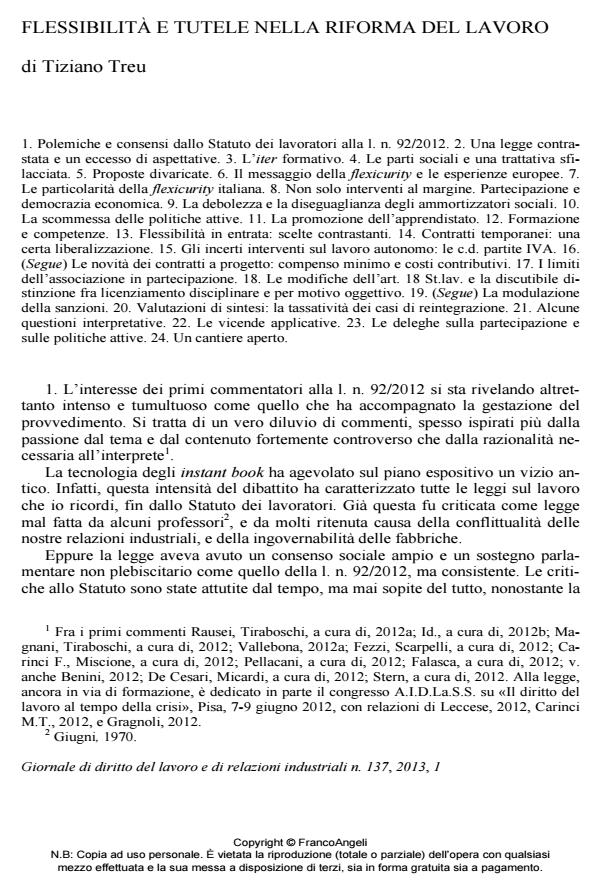Flessibilità e tutele nella riforma del lavoro
Journal title GIORNALE DI DIRITTO DEL LAVORO E DI RELAZIONI INDUSTRIALI
Author/s Tiziano Treu
Publishing Year 2013 Issue 2013/137
Language Italian Pages 51 P. 1-51 File size 466 KB
DOI 10.3280/GDL2013-137001
DOI is like a bar code for intellectual property: to have more infomation
click here
Below, you can see the article first page
If you want to buy this article in PDF format, you can do it, following the instructions to buy download credits

FrancoAngeli is member of Publishers International Linking Association, Inc (PILA), a not-for-profit association which run the CrossRef service enabling links to and from online scholarly content.
This paper presents a general analysis of the recent Italian legislation on employment relations and the labour market (Law n. 92/2012). It firstly examines the antecedents and formation of the Law both during the consultations of the social parties by the government, and during the debates in Parliament. The approval the Law by a vast majority of votes has not prevented divergent opinions and persistent criticisms. According to the Author, Law 92 draws a general inspiration from the European pattern of flexicurity, even though taking into account the specific features of the Italian Labour Legislation. The European directives on employees participation in the enterprise are also indicated as general principles of the Law. The various sections of Law 92 are analysed comparing their actual content with the objectives indicated by the government and with the European benchmarks. The Law improves the protection of employees in case of unemployment but the relevant measures are still weakened by the scarse effectiveness of employment services and labour policies. A most relevant innovation is the promotion of apprenticeship as the main measure to foster youth employment. The paper examines the regulations approved for the various types of labour contracts; fixed term contracts have been liberalized; on the contrary other types of «atypical semiautonomous contracts» have been subject to restrictions and made more costly, in order to limit abusive and unlawful practices. The paper examines the reform of Art. 18 of Law n. 300/1970 which provided for reinstatement in all cases of unjust dismissal. Art. 18 was criticized as an excessively rigid protection of permanent employees. According to the Author the new regulation is in line with other European systems, because it provides the judge with the power to differentiate sanctions according to the reasons of the dismissal: indemnity becomes the common remedy and reinstatement is reserved for the most serious cases. In conclusion, the paper underlines the importance of the implementation of the Law which depends on the judicial interpretations and on the future practice of collective agreements between the social parties which the Law empowers to modify the Law in various aspects.
Keywords: Labour market reform; Law n. 92/2012; flexicurity.
- Il lavoro in somministrazione: la fornitura di personale e la disciplina del rapporto di lavoro (con l'agenzia) Francesca Bassetti, in GIORNALE DI DIRITTO DEL LAVORO E DI RELAZIONI INDUSTRIALI 142/2014 pp.197
DOI: 10.3280/GDL2014-142002 - Flessibilità e politiche attive del lavoro. Note critiche sulla riforma monti-fornero Silvana Sciarra, in GIORNALE DI DIRITTO DEL LAVORO E DI RELAZIONI INDUSTRIALI 139/2013 pp.471
DOI: 10.3280/GDL2013-139005 - Decentramento contrattuale e incentivi retributivi nel quadro delle politiche di sostegno alla produttività del lavoro Piera Campanella, in PRISMA Economia - Società - Lavoro 1/2014 pp.53
DOI: 10.3280/PRI2014-001005
Tiziano Treu, Flessibilità e tutele nella riforma del lavoro in "GIORNALE DI DIRITTO DEL LAVORO E DI RELAZIONI INDUSTRIALI " 137/2013, pp 1-51, DOI: 10.3280/GDL2013-137001